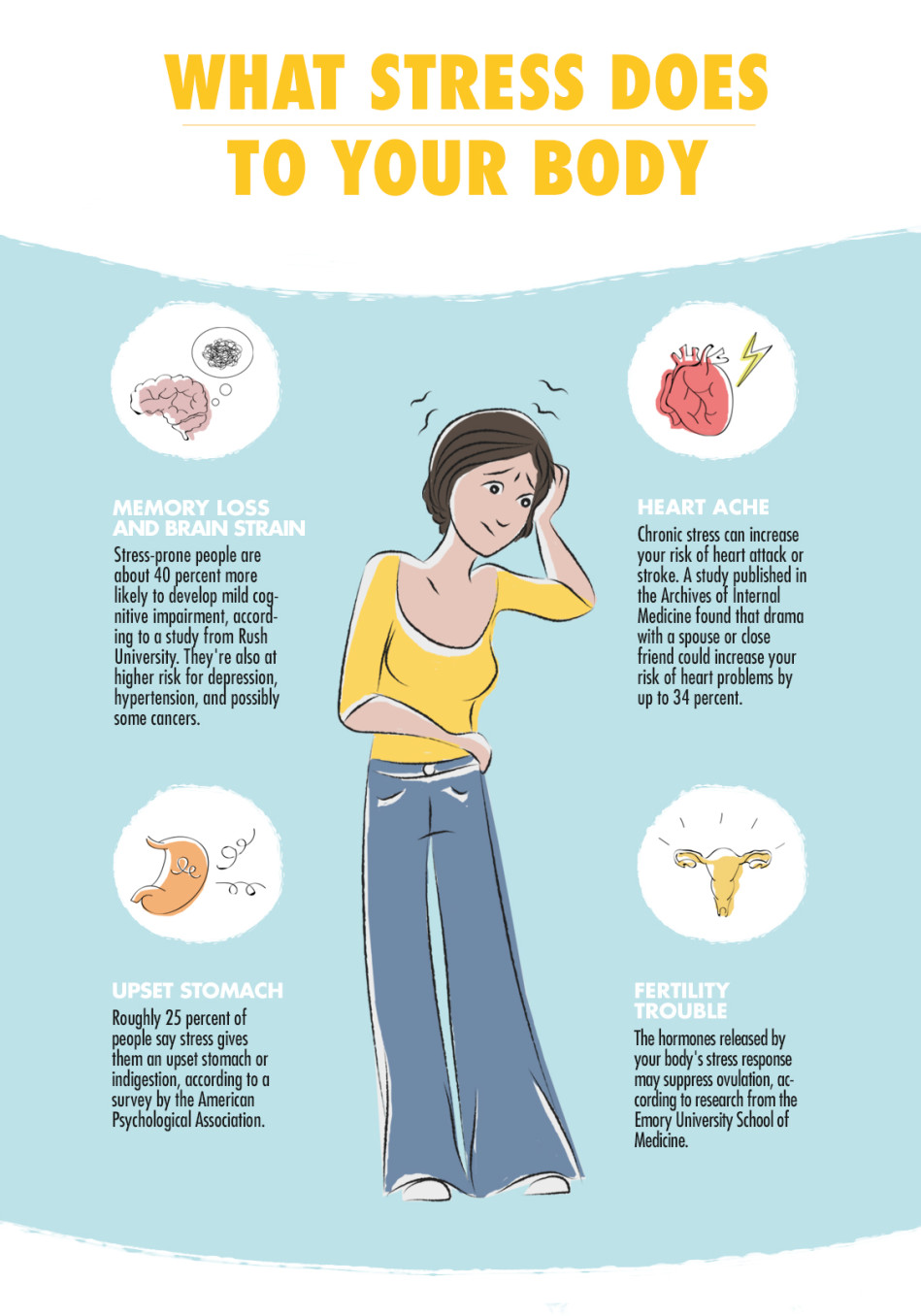The Science of Stress: 5 Things Worrying Is Doing to Your Body
Think you can't afford to relax? Consider the alternatives.

Illustration: Florie Duhau
Brain Strain
Stress starts here. When your body goes on high alert because of a real or perceived threat, your brain sets off your fight-or-flight alarm system, triggering your adrenal glands to release a flood of hormones—including adrenaline and cortisol, which increase your heart rate and blood pressure. Unfortunately, because so many of us are chronically stressed, our fight-or-flight response never shuts off and our cortisol levels remain elevated, potentially increasing the risk for depression, hypertension, and possibly some cancers.
Stomach Upsets
Roughly 25 percent of people say stress gives them an upset stomach or indigestion, according to a survey by the American Psychological Association. Here's why: Prolonged anxiety slows digestion as your nervous system directs its energy toward the organs and muscles most critical to survival. This, in turn, can cause nausea, constipation, cramping, and bloating.
Memory Loss
Stress-prone people are about 40 percent more likely to develop mild cognitive impairment, according to a study from Rush University. Researchers believe that high levels of stress hormones may damage or shrink the hippocampus (an area deep in the brain that's responsible for long-term memory).
Heart Ache
Chronic stress can increase your risk of heart attack or stroke. A study published in the Archives of Internal Medicine found that drama with a spouse or close friend could increase your risk of heart problems by up to 34 percent.
Fertility Trouble
The hormones released by your body's stress response may suppress ovulation, according to research from the Emory University School of Medicine. A separate study found that women undergoing IVF were 2.6 times more likely to get pregnant if they also participated in a stress-management program.
More Ways to Feel Great
Stress starts here. When your body goes on high alert because of a real or perceived threat, your brain sets off your fight-or-flight alarm system, triggering your adrenal glands to release a flood of hormones—including adrenaline and cortisol, which increase your heart rate and blood pressure. Unfortunately, because so many of us are chronically stressed, our fight-or-flight response never shuts off and our cortisol levels remain elevated, potentially increasing the risk for depression, hypertension, and possibly some cancers.
Stomach Upsets
Roughly 25 percent of people say stress gives them an upset stomach or indigestion, according to a survey by the American Psychological Association. Here's why: Prolonged anxiety slows digestion as your nervous system directs its energy toward the organs and muscles most critical to survival. This, in turn, can cause nausea, constipation, cramping, and bloating.
Memory Loss
Stress-prone people are about 40 percent more likely to develop mild cognitive impairment, according to a study from Rush University. Researchers believe that high levels of stress hormones may damage or shrink the hippocampus (an area deep in the brain that's responsible for long-term memory).
Heart Ache
Chronic stress can increase your risk of heart attack or stroke. A study published in the Archives of Internal Medicine found that drama with a spouse or close friend could increase your risk of heart problems by up to 34 percent.
Fertility Trouble
The hormones released by your body's stress response may suppress ovulation, according to research from the Emory University School of Medicine. A separate study found that women undergoing IVF were 2.6 times more likely to get pregnant if they also participated in a stress-management program.
More Ways to Feel Great



